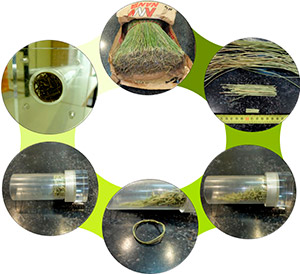Esparto grass
Researchers of the UPV and the UACh validate his suitability to insulate buildings from noise, heat and cold
[ 22/09/2020 ]
A team of researchers from the Gandia campus of the Polytechnic University of Valencia (UPV), in collaboration with the Austral University of Chile (UACh), is working on developing a new acoustic and thermal insulation material for buildings, made with esparto grass. According to the tests conducted, the properties of this material make it an ideal and much more ecological alternative compared to the most frequently used panels to insulate buildings from noise and heat – or cold. The results of their work have been published in the journal Sustainability.
In their study, the UPV researchers analysed the acoustic absorption properties of three types of esparto grass from different countries (Pakistan, Tunisia and Egypt), all supplied by the company Espartos Albarracín, from Murcia.
From their laboratories in the Gandia campus, the UPV team analysed the acoustic absorption coefficients and the air flow resistivity of each of them. And they also developed the first model for the prediction of the acoustic absorption of this type of material.
“The first results obtained confirm that these natural materials are a natural alternative to the synthetic options. Furthermore, the figures on the acoustic absorption of esparto grass from different countries show that indigenous or local esparto can be used, without having to ship it across large distances. This greatly decreases the carbon footprint, which entails a significant benefit for the environment,” highlights Jesús Alba, researcher at the Centre for Physics Technologies at the Gandia campus of the UPV.
Of the three types of esparto analysed, the esparto grass of Pakistan has greater absorption than the ones from Egypt and Tunisia. Therefore, when considering potential growing options, these would be the most recommendable ones.”
“These results open the door for the construction of practical and sustainable absorption panels, made out of esparto fibres, similar to others such as coconut, kenaf or jute,” stresses researcher Jesús Alba.
Ecological alternative and added value
As explained by Romina del Rey, fellow author of the study and researcher at the Gandia campus of the UPV, the esparto grass requires very little water to grow, and practically no chemical products. Thus, its production generates a very low carbon footprint and does not produce any chlorofluorocarbon (CFC) emissions.
“Furthermore, its use in the construction sector would grant it great added value, thus broadening the market for a product that has been the raw material for the manufacturing of ropes, matting, baskets and decorative elements for centuries,” adds Romina del Rey.
After this study, the team of researchers of the UPV and the UACh are now working on improving the durability of the product, as well as analysing the effects of adding fire retardant or insect repellent substances to the fibres.
Outstanding news
 Study a degree at the best technological university in Spain
Study a degree at the best technological university in Spain
The Universitat Politècnica de València is ranked number 1 among Spanish technology universities, according to the Shanghai ranking
 National Research Award
National Research Award
Ramón Martínez Máñez has received the "Juan de la Cierva" National Research Award in the area of Knowledge Transfer
 The UPV and Beihang University strengthen their academic and scientific alliance
The UPV and Beihang University strengthen their academic and scientific alliance
The two universities have signed a new collaboration agreement as part of the celebration of "UPV Day" in China
 Study in English
Study in English
The UPV offers eight degrees, 16 master's and 650 courses in English for the 2025-26 academic year
 THE Impact Ranking
THE Impact Ranking
The UPV, the Spanish university with the greatest social and economic impact in the world






